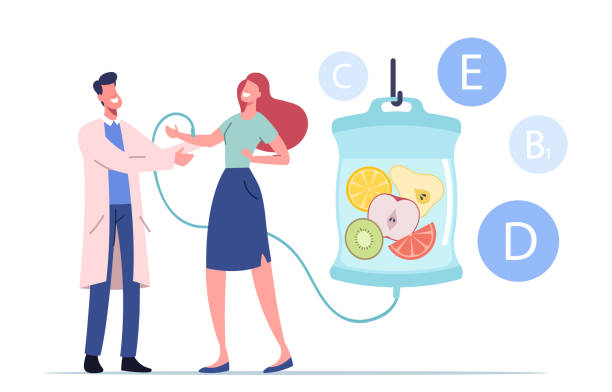Alternative Treatments
How Does IV Therapy Work?
These days, health and wellness are very important, and intravenous (IV) treatment has become a new, cutting-edge way to improve health and vitality. More and more people are interested in the idea of getting nutrients and water straight into the bloodstream, which sounds like a quick and effective way to deal with a number of health problems. This article dives into the world of IV therapy, looking at where it came from, how it works, and the many benefits it can provide. You can get more energy and better absorption of nutrients through IV treatment. Come with us as we break down this new way of looking at health and find out how it is changing the face of modern healthcare.

How IV Therapy Is Administered
The procedure begins with the insertion of a tiny needle into a vein, typically in the arm or hand. A sterile solution customized to the individual’s exact needs is then supplied via IV drip. This solution may contain a variety of vitamins, including vitamin C, B vitamins, and minerals such as magnesium and calcium, as well as other helpful ingredients. By bypassing the digestive tract, IV treatment ensures that these nutrients are completely absorbed and utilized by the body.
Once the solution enters the bloodstream, it spreads quickly throughout the body, providing nutrients directly to the cells. This allows the body to avoid any absorption troubles that may arise in the digestive tract. The end result is faster and more efficient nutrition delivery, which leads to improved general well-being and specific health advantages.

Benefits of IV Therapy
IV treatment provides numerous benefits for a variety of health goals and illnesses. Here are some of the main advantages:
- Improved Nutrient Absorption: IV treatment bypasses the digestive system, allowing for optimum nutrient absorption. This is especially good for people who have digestive issues or poor vitamin absorption.
- Increased Hydration: IV treatment introduces fluids straight into the bloodstream, resulting in fast hydration. This is especially good for athletes, people recovering from sickness or surgery, and those who are dehydrated.
- Enhanced Immune Function: IV treatment can strengthen the immune system by delivering a high concentration of immune-boosting vitamins and minerals. This is especially useful when you are more prone to disease or are recuperating from an illness.
- Nutrient Replenishment: IV therapy can treat particular nutrient shortages such as vitamin D inadequacy, iron deficiency, or low electrolyte levels. By immediately infusing these nutrients into the bloodstream, the body can quickly return to normal levels.
- Improved Athletic Performance and Recovery: IV therapy can help athletes perform better by restoring electrolytes, lowering muscle exhaustion, and facilitating speedier recovery following strenuous exercises or contests.

Different Types of IV Therapy
Improved Nutrient Absorption: Because IV therapy bypasses the digestive tract, nutrients are absorbed more efficiently. This is especially beneficial for those with stomach difficulties or inadequate vitamin absorption.
- Increased Hydration: delivers fluids directly into the bloodstream, resulting in rapid hydration. This is particularly beneficial for athletes, individuals recovering from illness or surgery, and those who are dehydrated.
- Enhanced Immune Function: IV therapy can boost the immune system by administering a high concentration of immune-boosting vitamins and minerals. This is especially beneficial if you are more susceptible to disease or are recovering from an illness.
- Nutrient Replenishment: can address specific nutrient deficiencies such as vitamin D deficiency, iron deficiency, and low electrolyte levels. By rapidly introducing these nutrients into the bloodstream, the body can swiftly return to normal levels.
- Improved Athletic Performance and Recovery: IV therapy can help athletes perform better by replenishing electrolytes, reducing muscle fatigue, and allowing for faster recovery after rigorous exercise or competition.

Popular Vitamins and Nutrients Used in IV Therapy
IV treatment uses a variety of vitamins and nutrients to address specific health concerns. Here are a few popular ones:
- Vitamin C, known for its immune-boosting effects, is a potent antioxidant that protects cells from harm and promotes general health.
- B vitamins (B12, B6, and B5) are essential for energy production, neuron function, red blood cell creation, and brain health.
- Magnesium is an important mineral that participates in over 300 metabolic activities in the body. It promotes muscle and neuron function, energy production, and bone health.
- Calcium is essential for strong bones and teeth, normal muscle function, nerve transmission, and blood coagulation.
- Zinc is an essential mineral that promotes immunological function, wound healing, DNA synthesis, and cell division.
The Process of Receiving IV Therapy
Receiving IV therapy is a simple procedure that usually takes place in a medical or wellness facility. Here’s what to expect:
- Consultation: Before getting IV therapy, you will meet with a healthcare expert. They will examine your health needs, discuss your goals, and recommend the best IV therapy option for you.
- Preparation: Once a solution has been selected, a healthcare professional will put a small needle into a vein, typically in your arm or hand. They will ensure the needle is secure and that you are comfortable throughout the procedure.
- Administration: The IV drip will then be attached to the needle, allowing the solution to enter your bloodstream. The pace of administration will be carefully controlled to ensure your safety and comfort.
- Monitoring: During IV therapy, a healthcare expert will check your vital signs to ensure that you are reacting well to the treatment.
- Completion: After the appropriate amount of solution has been provided, the needle will be removed and you will be given aftercare instructions.
Potential Risks and Side Effects of IV Therapy
While IV therapy is generally considered safe, there are some dangers and adverse effects to be aware of. These may include:
- Infection: There is a low risk of infection at the injection site. To reduce this danger, seek IV therapy from a trustworthy provider who adheres to strict sterile protocols.
- Vein Irritation: Occasionally, the solution infusion can irritate the vein, causing discomfort or inflammation.
- Allergic Reactions: Some people may develop allergic reactions to particular components of the IV treatment solution. It is critical to advise the healthcare provider of any known allergies prior to treatment.
- Fluid Overload: In rare situations, obtaining too much fluids via IV therapy can result in fluid overload, which causes symptoms such as edema, shortness of breath, or elevated blood pressure.
Who Can Benefit from IV Therapy?
IV treatment can benefit a variety of people, including:
- Athletes: IV therapy can speed up muscle recovery, improve athletic performance, and replenish electrolytes lost after strenuous training.
- Individuals with Digestive Disorders: For those who have disorders that impair nutrient absorption, such as Crohn’s disease or celiac disease, IV therapy can ensure that critical nutrients are supplied straight to the bloodstream.
- Individuals suffering from chronic fatigue syndrome or general weariness can benefit from IV treatment, which can deliver an energy boost while combating lethargy.
- Busy Professionals: For people who lead a busy lifestyle, IV treatment can be a rapid and effective way to enhance general well-being and increase immune function.
- Individuals with Nutrient deficiencies: People who have specific nutrient shortages, such as vitamin D inadequacy or iron deficiency, can benefit from IV therapy to swiftly recover their levels.
Finding a Reputable IV Therapy Provider
When considering IV therapy, it is critical to choose a trustworthy provider who values safety, quality, and professionalism. Here are some aspects to consider while selecting a provider:
- Credentials and Experience: Ensure that the healthcare personnel giving IV therapy are properly trained, licensed, and experienced in their specialty.
- Sterile protocols: To reduce the risk of infection, the practitioner should adhere to stringent sterilization protocols.
- Customized Treatments: Look for a provider who provides personalized IV therapy options based on your specific needs and health goals.
- Positive Reviews and Testimonials: Read past client reviews and testimonials to assess the provider’s reputation and level of customer satisfaction.
- Transparent Pricing: Select a supplier who offers transparent pricing and fully explains the costs of IV therapy.
Conclusion
Through IV treatment, important nutrients like vitamins, minerals, and water can be quickly and effectively delivered into the bloodstream. IV therapy is a treatment choice that you might want to think about because it might help your immune system, your athletic performance, nutrient deficiencies, and your overall health. Before starting IV therapy, you should talk to a doctor or nurse, make sure you choose a reliable provider, and go over your specific health goals and needs. IV treatment can be a helpful part of your health routine if you get the right care and advice.


